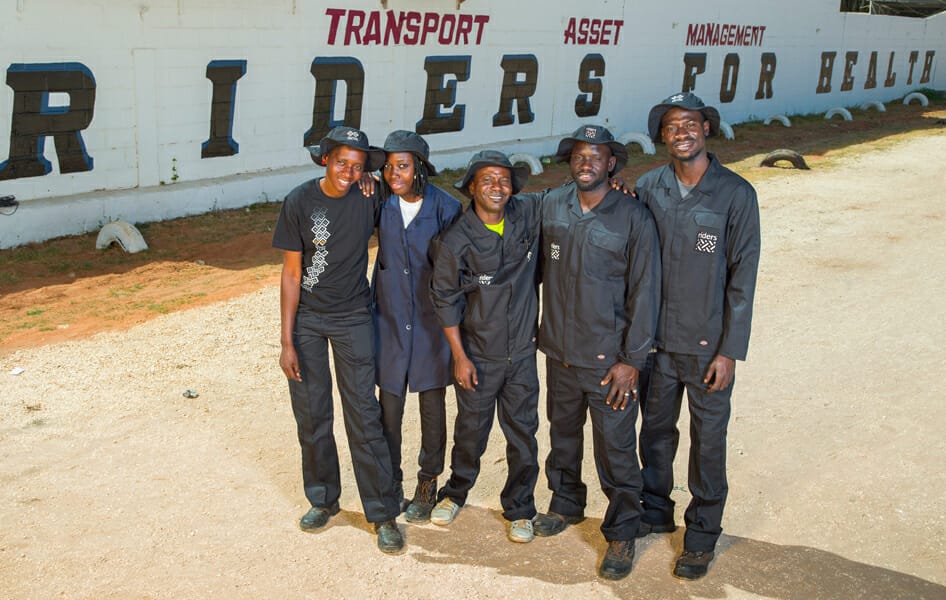With a goal of increasing access to much needed diagnostic services in the country, Riders for Health Malawi (known within the country as R4H) have created a sample transport (ST) network that stretches across the nation.
Reaching 716 health facilities across Malawi, samples moved include viral load, early infant diagnosis, COVID19, pathology and three kinds of tuberculosis sample (TB Microscopy, Genexpert and Culture).
With funding and in-kind donations from the University of Maryland Baltimore and the Ministry of Health, our ST program ensures professional, consistent and prompt collection of samples, delivery to labs and delivery of results.
The service is a huge asset to the nation’s people and to the health organisations that operate in the country as it enables and supports improved diagnosis and monitoring, and in many cases leads to the prevention of the spread of diseases and the initiation of treatment for patients.

Sample transport courier in Lesotho, mobilised thanks to Riders for Health
Programme summary January-December 2021
Samples transported: 594, 471
Results transported: 551, 123
Total Distance covered (January-December 2021): 1, 623, 484 KMs
Number of Staff (including couriers): 116 (103M 13F)
Number of couriers only: 84 (80M 4F)
News and stories
R4H introduces sample transport in Likoma district
Likoma District is situated within Mozambican waters in Lake Malawi. It consists of two main islands, Likoma and Chizumulu. It is a district in the northern region of Malawi. The island is mostly accessible by boat and air.
For years, there has been a health crisis for 18,000 Malawians based at Likoma and Chizumulu islands, due to challenges faced at St Peters Community Hospital which serves as the district hospital.
Specifically, the district has been faced with the following main ST challenges:
i. No well-established, reliable and efficient ST system
ii. Due to geographical isolation, very high operational costs
iii. Long Turn Around Time (TAT) for Viral Load Samples
iv. Stock-out of reagents as there has been no well-coordinated means for transportation
Participants during a sensitisation meeting were engaged in detailed discussions on sample transportation guidelines, overview of R4H and biosafety sample management. Introduction of the ST system into the district will ensure reliable and efficient transportation of samples and results, transportation of reagents and significant improvements in overall turnaround time for such samples as viral load.

Mr Bitilinyu, deputy director of the Health Technical Support Services (HTSS) department in the Ministry of Health diagnostics presents National Sample Transport System Guidelines to Riders staff.
R4H will continue to provide continuous support to the district to ensure that samples and results transported are properly recorded for easy follow-up.
Among other key activities, R4H will conduct district monitoring and evaluation review meetings and district spot check activities in order to ensure improved implementation of the ST programme in the district.
The launch of ST at Likoma Island has increased ST coverage from 714 to 716 health facilities.
Cold chain sample transport
R4H sample and results transport service aims at increasing access to advanced diagnostics with funding from UMB. In recent past years, R4H has been transporting dry blood samples predominantly which are dry samples and do not require much in the transporting conditions.
In 2021, MoH introduced HIV viral load testing using plasma sample type 2 molecular labs at Queen Elizabeth Central Hospital (QECH) and Kamuzu Central Hospital (KCH). This prompted R4H and its funders to set up a ST service that efficiently and effectively transport cold chain samples. The cold chain transport involved revision of routes, ST materials i.e. introduction of
cooler boxes, ice packs, racks and temperature monitoring tools.
The cold chain ST system was implemented in Lilongwe, Salima and Blantyre. R4H plans to expand the
cold chain ST system to other districts in responding to the HIV VL Plasma scale up, CD4, Creatinine samples for PREP program, COVID19 surveillance samples, Urine TB LAM samples and other samples that require cold chain ST conditions.
Sample transport pull system
This is a new innovation which has two main components. First, an Unstructured Supplementary Service Data (USSD) based cell-phone application allowing health workers to signal the need for ST directly to the ST operator i.e. R4H with very little effort and at no cost. Second, an optimization-based algorithm for scheduling and routing couriers based on this information. This system aims to solve the problem of unnecessary trips and reduce sample turnaround times by installing a
low-cost system for communicating ST demand from Health facilities to district ST operators and integrating it with optimisation software for scheduling routes on a daily basis using powerful analytics. In other words, health facilities report the volume of samples that they have on a daily basis using USSD codes of the various facilities. After the sample volumes are submitted, routes for the next day are scheduled based on the information received that day i.e. based on demand.
The project is being implemented in 3 districts and these are Rumphi, Salima and Phalombe while the other 3 districts of Mchinji, Machinga and Nkhatabay are being used as control districts.
To date, the ST pull system has registered the following achievements;
- Improved turn around time
- No empty trips
- No wastage of resources such as fuel

